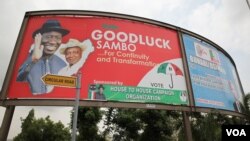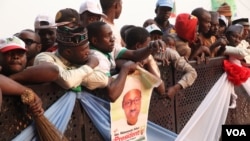Political campaigns are serious business in Africa’s most populous democracy, and what you wear as a candidate is often as important as what you say.
While the Western-style coat-and-tie is standard attire for presidents and prime ministers in many parts of Africa, in a country like Nigeria, with nearly 174 million people and dozens of languages and ethnic groups, wearing traditional garb is key for connecting with voters.
In the run-up to Saturday’s national vote, both incumbent President Goodluck Jonathan and his challenger, former military ruler Muhammadu Buhari, have donned a wardrobe’s worth of regional attire.
That's ranged from babban riga favored by the Hausa people of the north to the red caps commonly worn the southeastern Igbo people, all in a quest to win votes across the nation.
“It is necessary for anybody who is vying for the Nigeria president to attempt to appeal to the diverse groups that constitute Nigeria,” said Abubakar Kari, a lecturer at the University of Abuja. “One of the strategies for ensuring that a candidate appeals is to dress like these different diverse segments of Nigerian society.”
Along a major freeway in Abuja, the country’s capital, billboards supporting Jonathan’s campaign show him smiling in a polo shirt, and striking a confident pose in the dark outfit and wide-brimmed hat of the “resource control,” fashion from his home region in the Niger Delta. Jonathan is from the Ijaw ethnic group, common to southern Nigeria.
As for Buhari, who is known as Hausa-Fulani, he’s often pictured in a suit and tie in his social media profiles, he’s best known for wearing the kaftan and babban riga common to Hausa regions.
The only outfit he doesn’t wear is a military uniform, despite his background as a military general who took over the presidency in a coup in 1983, before he was kicked out by a rival general two years later.
“Buhari has a particular image that he’s trying to mop up now. People know him as a core northerner,” said Muna Onuzo-Iyanam, a business etiquette consultant based in the commercial capital, Lagos.
““If Buhari comes to Imo state," a state in the southeast that’s expected to support Jonathan, "and he’s wearing his core northern attire, that means that he doesn’t even want to respect the culture of the people that he’s coming to rule,” said Onuzo-Iyanam.
In a huge, diverse country with a long history of regional division, Sadiq Umar Abubakar Gombe, national secretary of the Social Democratic Party, which is not contesting the presidency, said dress is an easy way of connecting with a crowd whose tradition, culture and first language a campaigning politician might not share.
“Our people are so much attached to their culture, they’re so much attached to their norms and values,” Gombe said. “So that’s why you see when candidates go there, they want to dress like them so that, ‘I am one of you.’”





